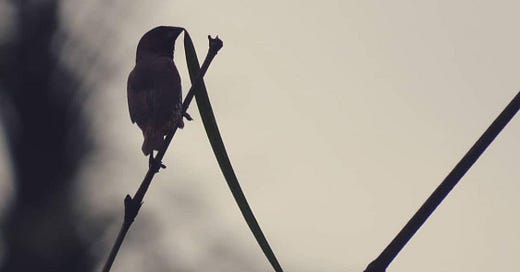I am fortunate to be staying next to a hillock, colloquially called a tekdi in Pune. Often, I can hear the coucals from its rugged slope, and sometimes even a barbet. At dawn and dusk, when the sun is behind the apartment buildings, I can see egrets fly over the tekdi, and away to the Pashan lake near the highway.
Cupped between the tekdi and my building is a society of row houses. With a mowed lawn and manicured garden, red roofs and sleek driveways, it almost looks like a lego landscape or dolls’ house from my balcony. And the trees look like paper mâché pieces, painted different shades of green, and blossom studded in winter. What animates this scene further are the dog walkers, baby strollers and yoga enthusiasts. Sometimes, I feel voyeuristic, but mostly I blur my gaze and don’t look at details. Specificity brings people to life; without that they are the others whom I don’t know enough. They become part of the landscape.
What makes this nested community of posh row houses most interesting from my balcony are the birds on the trees. Sunbirds, white-eyes, tailorbirds, tits, magpies; the common urban garden birds, and the loud screeches of the hornbill sometimes. And the constant calls of the koel. Incessant coos of the mating koel in summer, interrupting conversations. The sharp shrill air-piercing distance-snapping call of the koel. From March, this call breaks into the morning, as early as two am sometimes. And it goes on as the sun slides golden on the building windows, creeps above the under-construction metro, JCBs below, as the noise takes over the road outside the society. As the residents slip into formal wear, heft laptop bags and ride out from the society gates.
The koel persists in its mating songs. A couple of weeks back, I woke up at four am, shook Jigar awake from his sleep, and feverishly asked him ‘Where are the koels?’ I was told of this the next morning. I googled about the Indian koels, and was told that they are shy birds, who sometimes go completely quiet while fulfilling their nesting duties. Also, that they are not nocturnal birds really. They are daytime singers, but in cities, the night provides better acoustics for their mating songs. The quiet night outside my balcony was not an anomaly. It meant the koels had found a night of rest too.
I am used to the koels singing at night. Quiet was unsettling. But I guess the koels relying on the night must be disquieting to the koels too. I knew this about the lapwings; that they nest on the ground and when they shriek at night, it is because they feel threatened by other nocturnal creatures. All birdsong is not happy.
I received about four rejection letters last week, two for a fiction piece and two for two sets of poetry. The fiction rejects read like tiered, and that is a decent consolation. Even when I was sending out a desi Kutch-based story to international magazines, I knew the chances were slim. This does not mean I think the story is good. Maybe it is not. I had shortlisted other fiction magazines, and I have sent the story there now. The poetry rejects were written beautifully. All rejection is not sad.
Sometimes, the city is too noisy. The koels learn to sing at night. The lapwings could have learnt to build nest on branches, but they did not.
Birdsong from My Patio
Despair so easy. Hope so hard to bear.
THOMAS MCGRATH
I've never heard this much song,
trills pure as crystal bells,
but not like bells: alive, small rushes
of air from the tiny plush lungs
of birds tucked in among the stiff
leaves of the olive and almond,
the lemon with its hard green studs.
As the sun slides down newborn
from thick muscled clouds
their glittering voices catch the light
like bits of twirling aluminum.
I picture their wrinkled feet
curled around thin branches,
absorbing pesticide.
I see them preening, tainted
feathers sliding through their glossy
beaks, over their leathery tongues.
They're feeding on contaminated insects,
wild seeds glistening with acid rain.
And their porous, thin-shelled eggs,
bluish or milky or speckled,
lying doomed in each
intricate nest. Everything
is drenched with loss:
the wood thrush and starling,
the unripe fruit of the lemon tree.
With all that's been ruined
these songs impale the air
with their sharp, insistent needles.
- Ellen BassMeanwhile-
1. Here is Sumit’s post about the poetry reading event we recently organized at Pagdandi.
2. Kunjana Parashar is here with her much-awaited award winning debut poetry collection, ‘They gather around me, the animals’. You can follow her on Insta and DM her to purchase a copy.
3. I really liked this essay ‘The Hatred of Poetry’ shared by Arjun Rajendran. It is a practical take on why we write poetry; no mystery, no drama. Or perhaps, only enough drama to go on.



Koels vanished from my window where they had made a home in the water drainage pipes. For years, I have seen them fight with each other over who built the nest first. This beautifully crafted piece stole my heart. Thank you!
Loved the essay and the way in which it describes all that is around. I did not knwo that about lapwings! But of course something to always learn from your essays.